| “It’s brave to have something this bold that conveys the social and physical history of Birmingham. It transforms without obliterating. The connection to the community is powerful. It is making no small plans.” —2012 Professional Awards Jury “勇敢的将伯明翰的历史文化传承,强有力的联系社区,非同小可的规划” 2012年专业奖评审委员会 Red Mountain / Green Ribbon — The Master Plan for Red Mountain Park By WRT, Philadelphia 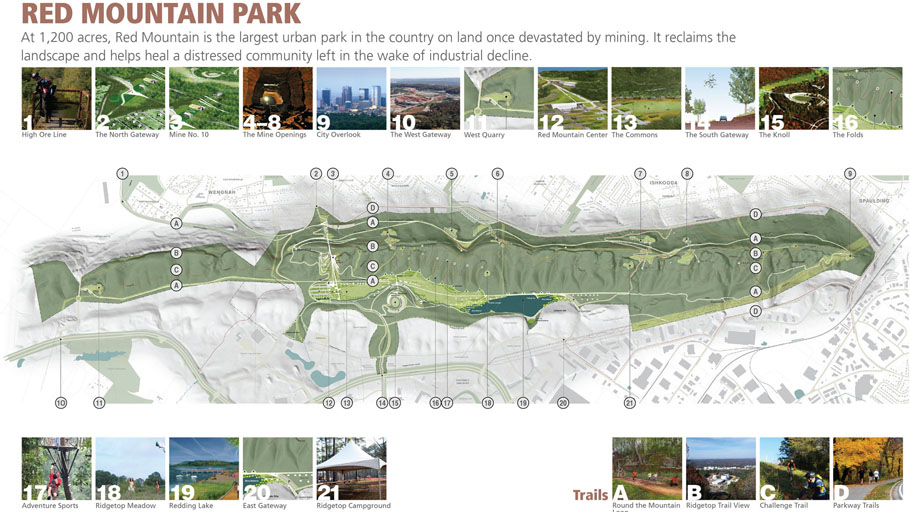 Red Mountain Park. At 1,200 acres, Red Mountain is the largest urban park in the country on land once devastated by mining. It reclaims the landscape and helps heal a distressed community left in the wake of industrial decline.占地1200亩的红山公园是从工 业废墟上建立的全美最大城市公园,力求在工业衰退后进行转型,促进社会。 前身为采矿废墟的红山公园目前是全美最大的城市公园,这个位于城市边缘的公园联系着 城市新旧两个区域。立在两个区域之间的山,就像是这两个区域之间历史悠久种族差异和 经济差异的象征。期望新公园可以将旧有非裔社区与新社区融合。 完工后园区的风景与人们通常所知的类型不同,新公园将是一个娱乐理疗公园。40英里的 步道(包含10英里的铁路步道,4英里的高架步道),45英亩公共用地,20英亩湖泊,各 种娱乐区,此外还有关于矿山公园的说明展望以及9个矿坑的景点。公园用绿道将周围区 域联系,对整个大区域的可持续发展起到促进作用。 这个绿色的大公园将作为伯明翰市的绿色进出设施,带动城市经济发展,帮助伯明翰城市 从错综复杂的历史中走得积极。为了市民。 园中布置了6个组织方案:活力(公众健康娱乐);工业历史(文物);重建(环境恢 复),连系(绿道与社区的联系),战略合作(街道振兴,新发展合作关系),管理(服 务管理和绿色建筑/运营)。 这是私人用地可持续发展的一个佳例。重建计划包含森林栖息地的长期恢复管理,利用生 物工程技术改善上游水质,清除外来入侵物种。以LEED,生态管理企划,可持续的标准 为准则进行发展。 社会的可持续性发展通过4个方面表现:休闲活动提高公众健康,历史主体关联社区认 同;紧密联系还有确保社会公平。山北侧的黑人社区在阴影和历史的边缘中暗淡成长,南 边区域则是高质生活区域。新公园希望打破这个壁垒并促进相互稳定的发展,同时保护历 史。 经济的可持续发展性:可以在公园内一个集中区域修建酒店和会议中心。公园周边地价将 上升。一些娱乐场所有出租,门票,餐饮,零售,演唱会等方面会为公园带来收入。在园 区为北区运营培训学校,为社区增加经济属性。 客服和景观设计师结合公众还有专家参与,从各方面收集了环境和社会数据: 将数据编译为可视化的地图,分析出高价值区域,定义功能。遵循重要决策的基础下,根 据公众会议增加额外优选建议。允许委员会和相关团体介入项目。将公园设计成一个具有 活力,充满吸引力的神秘考古遗迹,井下矿坑的几何要素延伸到地面组织。利用文化资源 将这里塑造成为一个积极变革的地区,引发公众兴趣,促进筹款。 第一期的3000万美元资金通过各个民营企业,州县市联邦,各种组织。以后的实施将取决 于公园的发展和未来的捐款,各项计划开始启动,志愿者已经开始建设步道和去除入侵植 被。未来,美国钢铁公司和一个督导委员会将协作运行管理委员会,管理这个国家休闲 区。 Red Mountain Park is the largest urban park in the country reclaimed from a landscape devastated by a century of mining. Located along a ridgeline on the edge of the city, the 1200-acre park will connect the new and old Birmingham — revitalizing the long- disadvantaged northern community left in the wake of mining. Referred to in the press as the Great Divide, the mountain is a vestigial symbol of the city’s formerly divisive historic racial and economic conditions. The park will bridge the two communities, linking the older historically African American communities to newly developing communities on the other side of the mountain. 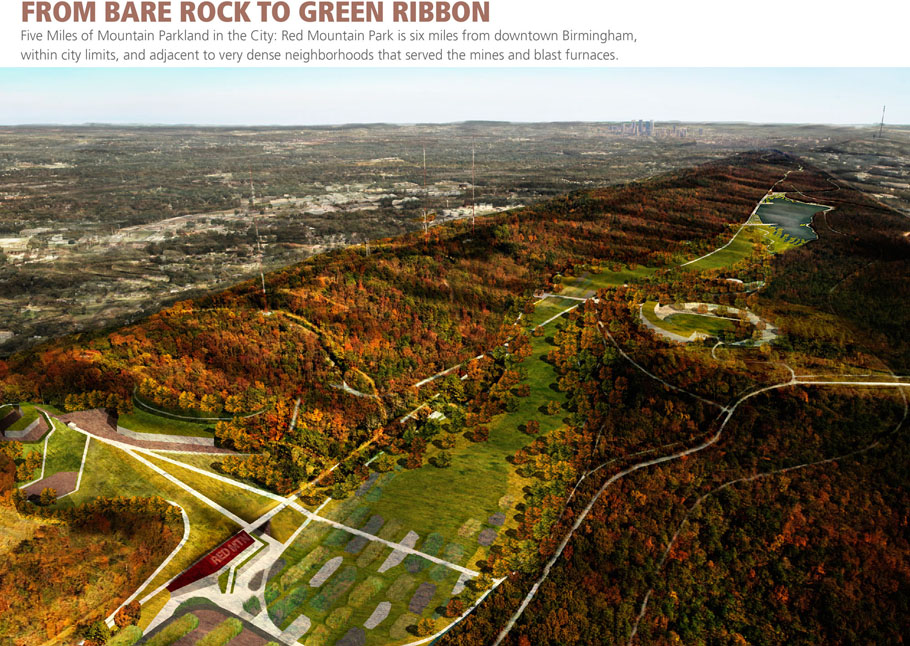 From Bare Rock to Green Ribbon. Five Miles of Mountain Parkland in the city: Red Mountain Park is six miles from downtown Birmingham, within city limits, and adjacent to very dense neighborhoods that served the miners and blast furnaces. 从裸露的土地变 为绿土地。这个公园紧邻城市,离市中心只有6公里。 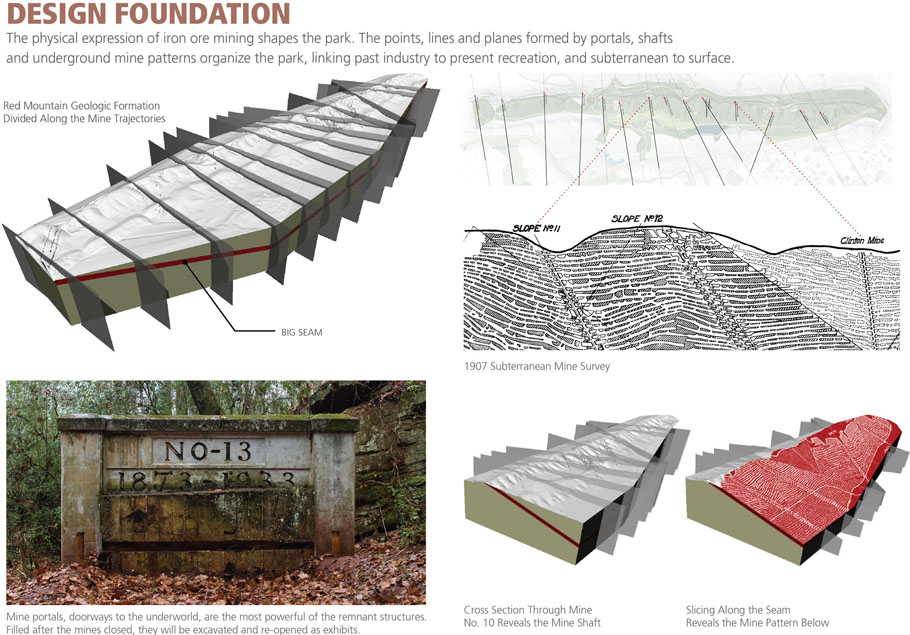 Design Foundation. The physical expression of iron are mining shapes the park. The points, lines and planes formed by portals, shafts and underground mine patterns organize the park, linking past industry to present recreation, and subterranean to surface. 有助于理解过去矿山的一系列图示,这些要素同时反过来影响现在的设计。 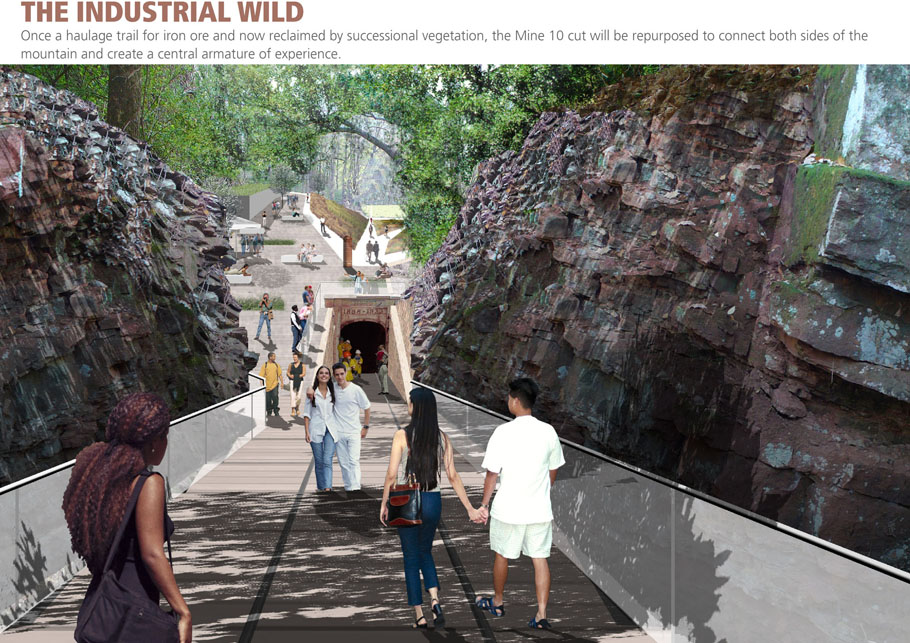 The Industrial Wild. Once a haulage trail for iron are now reclaimed by successional vegetation, the Mine 10 cut will be repurposed to connect both sides of the mountain and create a central armature of experience. 工业野原。这里将由植被慢慢复原,10个矿 道将更好的联系山两侧。 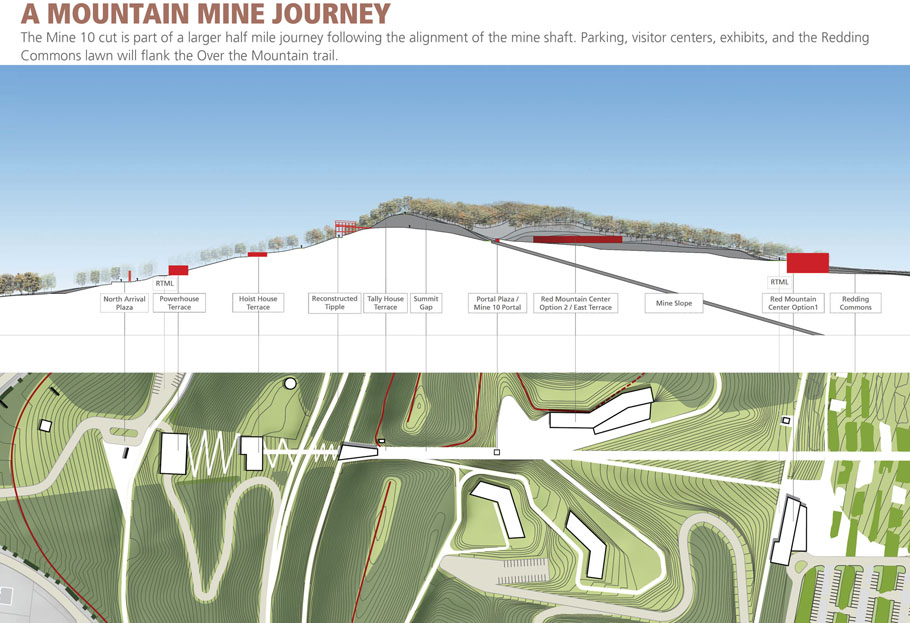 A Mountain Mine Journey The Mine 10 cut is part of a larger half mile journey following the alignment of the mine shaft, parking, visitor centers, exhibits, and the Redding Commons lawn will flank the Over the Mountain trail.剖面。矿井,停车场,游客中心,共 享草坪凳的关系。 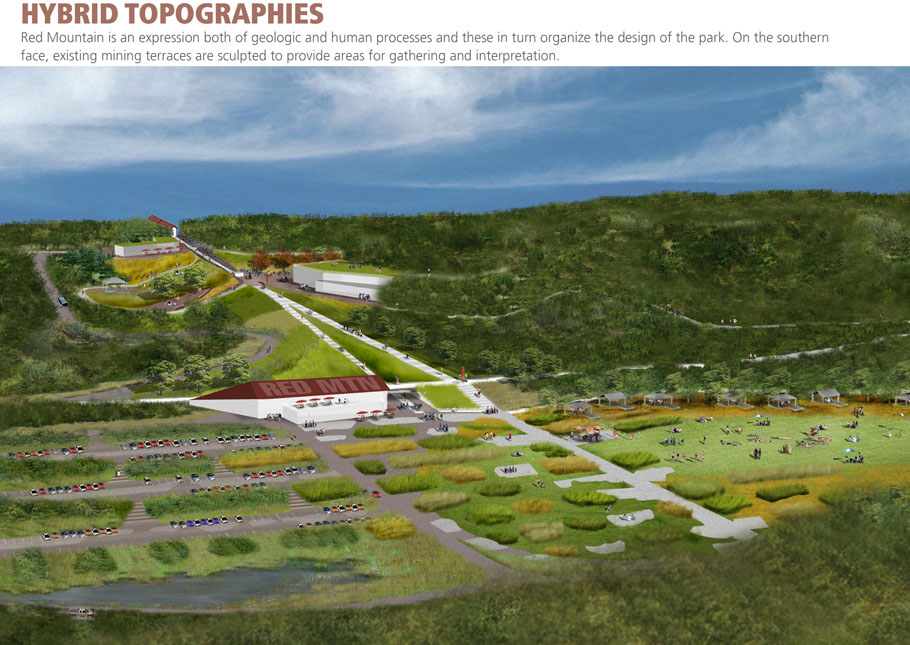 Hybrid Topographies. Red Mountain is an express both of geologic and human processes and these in turn organize the design of the park. On the southern face, existing mining terraces are sculpted to provide areas for gathering and interpretation. 符合地形,红山是地质和人工的产物。南侧地形呈梯田状。 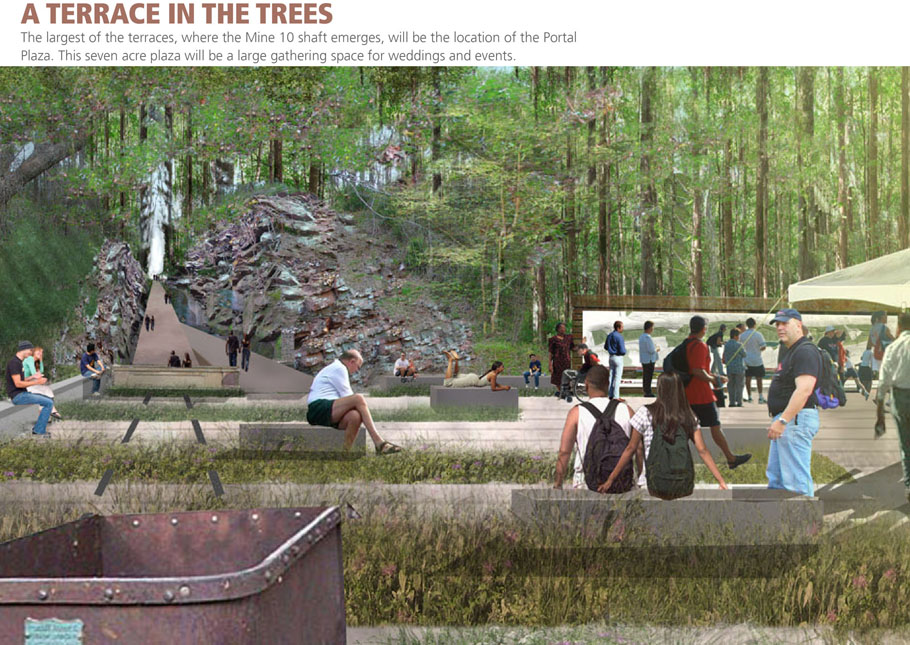 A Terrace in the Trees. The largest of the terraces, where the Mine 10 shaft emerges, will be the location of the Portal Plaza. This seven acre plaza will be a large gathering space for weddings and events. 林间的7英亩广场,这里比邻主要的10矿道,是门户广 场,也是聚会和主要事件空间。 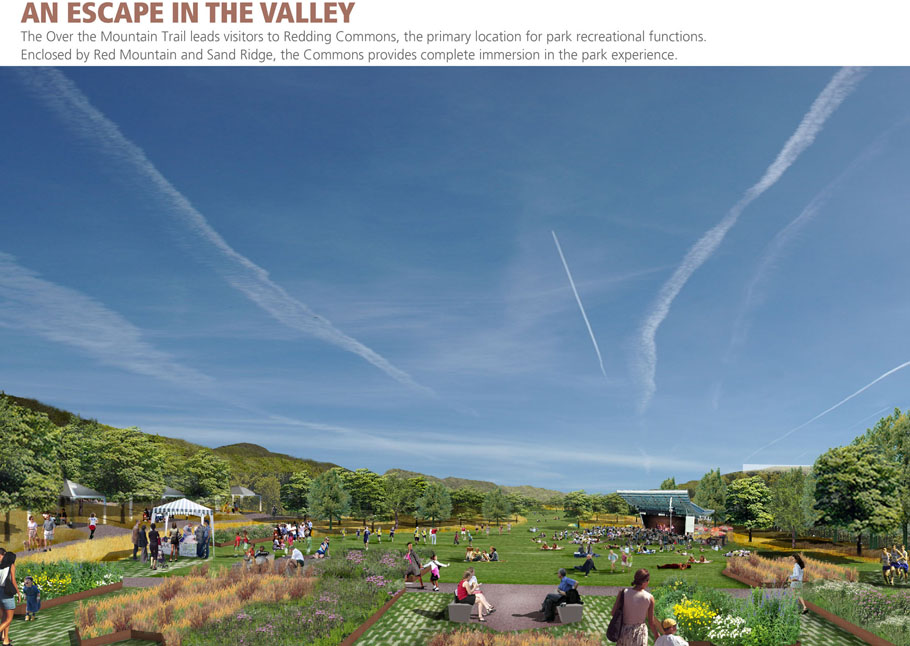 An Escape in the Valley. The Over the Mountain Trail leads visitors to Redding Commons, the primary location for park recreational functions. Enclosed by Red Mountain and Sand Ridge, the Commons provides complete immersion in the park experience. 被山和植物包围的谷中旷地,人们在这里尽享公园乐趣。 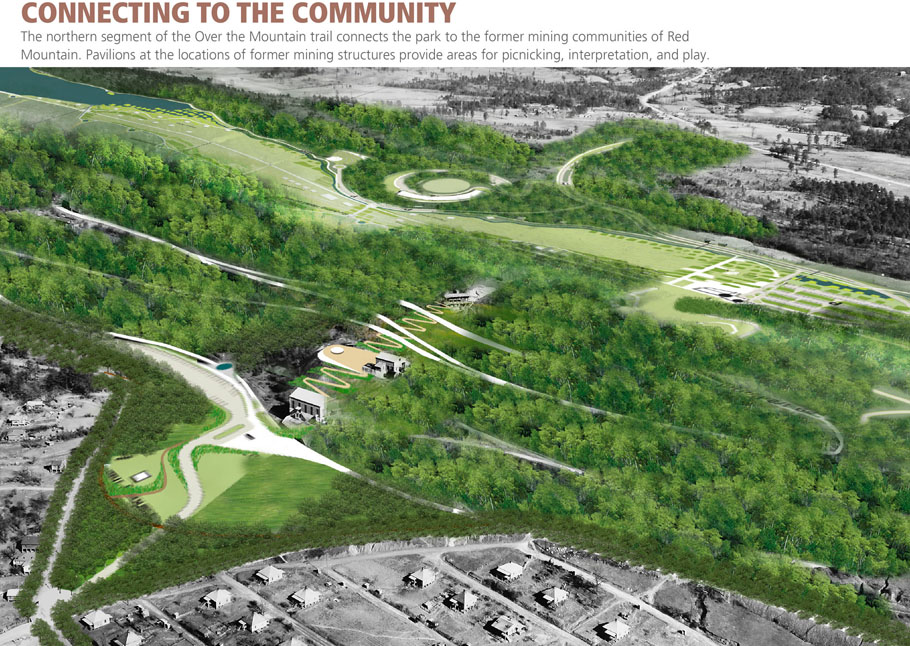 Connecting to the Community. The northern segment of the Over the Mountain trail connects the park to the former mining communities of Red Mountain. Pavilions at the locations of former mining structures provide areas for picnicking, interpretation, and play. 与社区相连。建筑物前提供野餐,聚会等区域。 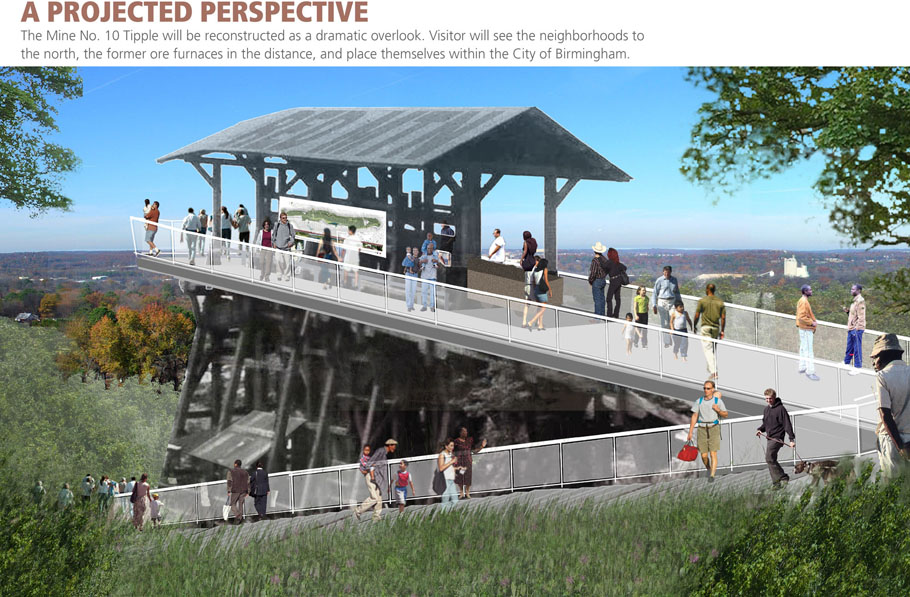 A Projected Perspective. The Mine No. 10 Tipple will be reconstructed as a dramatic overlook. Visitor will see the neighborhoods to the north, the former ore furnaces in the distance, and place themselves within the city of Birmingham.10号矿井附近的观景亭, 为人们提供不一样的观揽视角,看到北区,矿炉,城市。 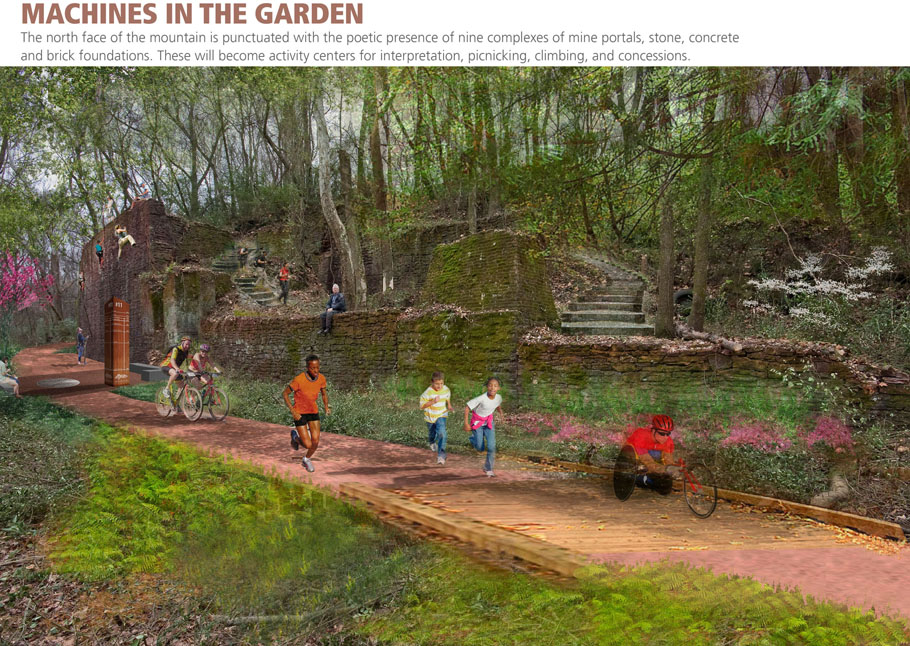 Machines in the Garden. The north face of the mountain is punctuated with the poetic presence of nine complexes of mine portals, stone, concrete and brick foundations. These will become activity centers for interpretation, picnicking, climbing and concessions.用石材,混凝土,砖打造出支持活动,登山,野餐,跑步,运动的设施。 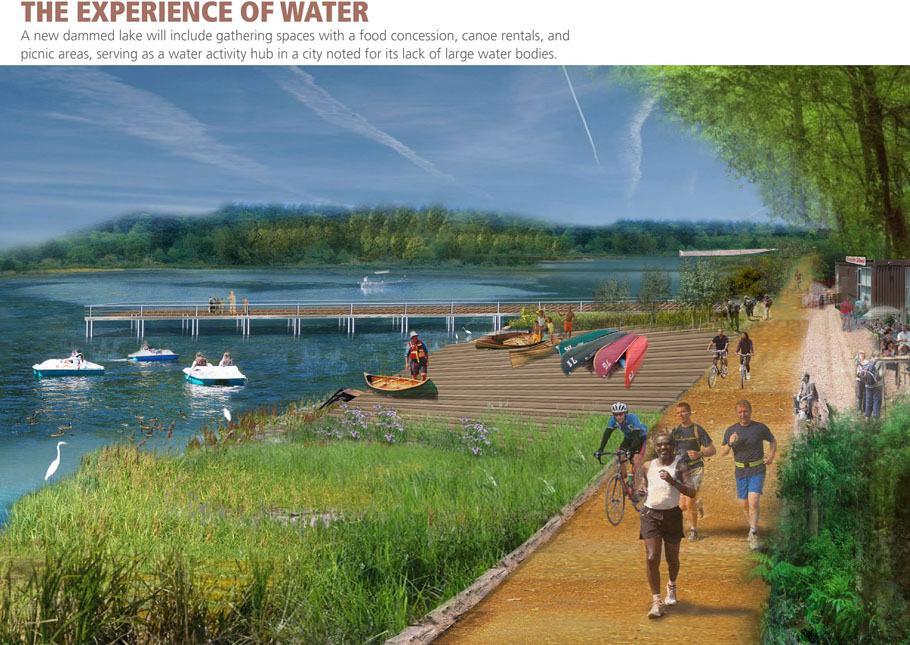 The Experience of Water. A new dammed lake will include gathering spaces with a food concession, canoe rentals, and picnic areas, serving as a water activity hub in a city noted for its lack of large water bodies. 大面积新人造湖周边的野餐区,步道,独木舟出 租区…… 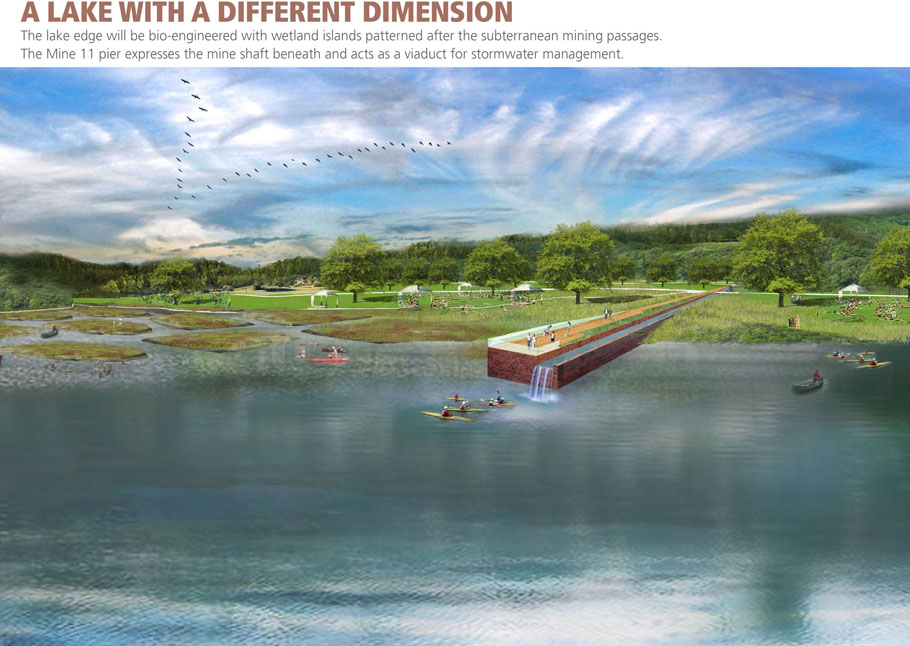 A Lake with a Different Dimension. The lake edge will be bio-engineered with wetland islands patterned after the subterranean mining passages. The Mine 11 pier expresses the mine shaft beneath and acts as a viaduct for stormwater management. 不同层次的 湖面。生态驳岸与湿地岛屿,高架雨水管理引水。  Marketing the Land: Iron Totems & Steel Discs. Totems and ground markings along the Round the Mountain Loop located at each mine slope crossing will situate visitors within the park as well as within their geologic, historic, and temporal contexts. 锈蚀钢板指示系 统。  A Park Without Borders: Partnership & Outreach. The Park will expand over time to include adjacent elevated rail-to-trail corridor, a major quarry, adjacent ridgetop land, and “offset development” parcels. Adjacent communities to the north will benefit from revitalization planning. 与周边密切联系,拓展发展振兴,北区也将受益。 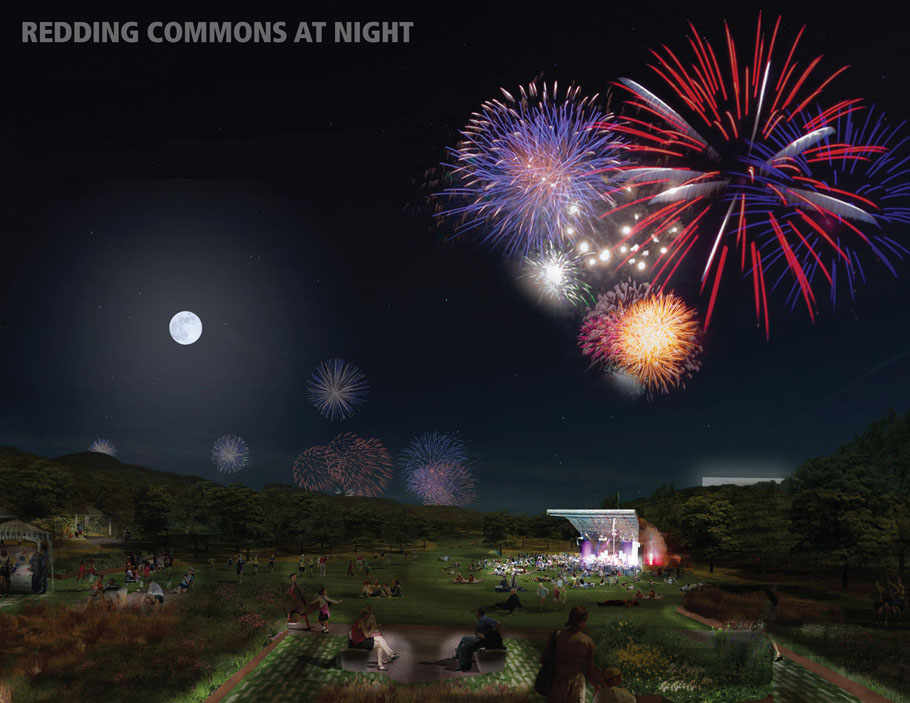 Redding Commons at Night. 夜景 When complete the park will change people’s minds about the long lost landscape, creating a type of community therapy via recreation. Features include over 40 miles of trails with a 10-mile rail trail and a 4-mile highline trail on elevated rail grade, a 45-acre commons, a 20-acre lake, and various active adventure recreation areas. In addition, nine historic mine openings will be interpreted, with one mine as the park’s interpretive and development focus. Reaching well beyond the park boundary to connect to and secure the future stability of the adjacent communities via greenway links, the project helps to improve both the long-term sustainability of the site and the larger community. A redemption story in the making, the park will anchor Birmingham’s new green infrastructure, and spur associated economic spinoff in a region much in need of a civic “victory.” The park will play a central role in helping Birmingham reconcile its proud and complex history, and move on from its dual identity as epicenter of civil rights struggle and former iron making giant. Six themes organize the program and layout of the park: Vitality (public health and recreation), Heritage (industrial history), Renewal (environmental restoration), Connection (greenway and community links), Partnership (neighborhood revitalization, new development partnerships), and Management (stewardship and green building/operations). Environmental Sustainability is demonstrated by the protection of the parkland from private development. The Renewal Theme includes plans for long-term forest and habitat management, reclamation of disturbed mined areas. The Management Theme employs bioengineering techniques to highlight upper watershed water quality improvement, invasive species removal (kudzu and Chinese Privet), transmission line eco-management plan, and commitment to LEED and Sustainable Sites Initiative standards for new construction. Social Sustainability is demonstrated by four themes: the Vitality Theme enhances public health through active recreation, the Heritage Theme bolsters community identity, and the Connection and Partnership Themes secure social equity. The healing process is begun by using the park to link two very different communities divided by the mountain even prior to the mid-19th Century onset of mining. The division was accentuated as the northern communities, company towns developed by the mining company, struggled with mine closings in the mid-19th century. These historically black communities have subsisted in the mountain’s shadow, with no relationship to the vast abandoned mine lands (private corporate holdings sealed to public access). In contrast, the southern communities represent the region’s most ambitious growth: golf courses, signature hotel, planned communities, and office parks define a lifestyle far removed from the northern communities. The Master Plan expresses the client’s desire to use park planning, physical design, and programming to break the barriers and to organize a neighborhood stabilization, historic preservation, and improvement plan in response to the new park. Cultural heritage is vital to preserving community identity of the former company towns still inhabited by original miners and their descendants. Economic Sustainability is demonstrated by the Partnership and Management themes. The client is exploring a park-related development such as a hotel or conference/retreat on a key site within the park. Adjacent lands with strategic economic value are under consideration for acquisition as park revenue-generators, to assure the park’s long- term viability and provide a revenue stream to accelerate construction of capital improvements. Several opportunities for park-specific revenue include a sliding-scale gate fee, rentals, and equipment, tour and food concessions. The effect on the northern communities is viewed as having a strong increase in property values, providing additional spinoff retail opportunities and, in concert with a local community college, a park operations employment training program. An economic impact report projects significant regional impact from these cumulative efforts, and an increase in adjacent land values commensurate with John Crompton’s proximate value principle. Environmental and Social Data Collected and Analyzed The client and landscape architect developed a broad public engagement campaign to gain knowledge of the environmental, cultural and social conditions, and to lay the groundwork for consensus of the wide range of stakeholders. Local residents, public officials, arts, civic advocates, educators, health professionals, law enforcement, disabled persons, religious leaders, and business leaders participated in the workshops. Panels of experts — ecologists, geologists, recreation interests, and historians — also participated. Based on the interviews, focused environmental data was derived from county GIS mapping, the archives of U.S. Steel, a previous heritage area documentation including HABS HARE records, exhaustive cultural resource- mapping project, and a targeted bio-inventory. Methods of Analysis Data was compiled in a series of inventory maps presented for review and contribution at an open public meeting, stakeholder meetings, and key issue focus groups. Future tasks such as a bioblitz and detailed cultural resource documentation efforts were recommended to fill in the gaps. The outcome of the inventory placed a high value on the mine infrastructure as the defining feature, supported by the environmental context of deciduous forest that has substantially reclaimed the mine lands. How Options Were Considered With the major decision to create the park already in place, a “foundation plan” laid out common elements with universal appeal. Facilitated public meetings were conducted to review the foundation plan and determine the preferred additional elements. How Interested Parties Participated in the Project The Steering Committee, including stakeholder group leaders (community stakeholder groups, focused topic specialists, general community support via the Friends of Red Mountain Park, and a dedicated My Space community) all enriched the process. The Role of Design in Project Design transforms a hidden archaeological relic into a vital, living attraction. The design extends the underground mine geometry to the surface, providing the basis for the vectors and patterns that shape park circulation and features. Strong compositions re- position the cultural resources (mines, railroads) as focal points of recreation and touchstones of history. The intent is to shape a positive and transformative image for an abused landscape both to inspire public interest and catalyze fundraising. How the Project Will Be Implemented A $30 million first phase will kick off implementation, based on a patchwork of funding from private corporations, city, county, state, federal and nonprofit granting entities. Future phase implementation will depend on collateral development revenue and future allocations and donations. Detailed cultural and natural resources investigations and oral history interviews with miners are in progress now, and volunteers have begun building trails and removing invasive vegetation. How the Project Will Be Administered Following its birth, first under the auspices of U.S. Steel and then a steering committee, legislation established a governing commission to oversee the land as a state recreational area and greenway. A park friends group and a non-profit fundraising arm support the commission. VIA:ASLA 原文地址http://www.gooood.hk/Red-Mountain-Park-By-WRT.htm |